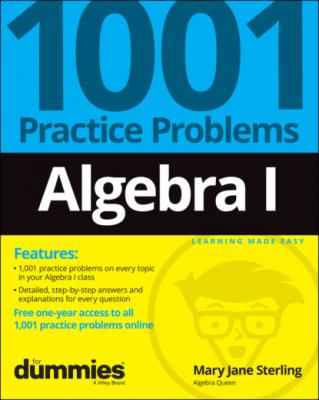Algebra I: 1001 Practice Problems For Dummies (+ Free Online Practice). Mary Jane Sterling
Чтение книги онлайн.
Читать онлайн книгу Algebra I: 1001 Practice Problems For Dummies (+ Free Online Practice) - Mary Jane Sterling страница 21

350.
Using Pascal’s Triangle
351–360 Raise the binomial to the indicated power.
351.
352.
353.
354.
355.
356.
357.
358.
359.
360.
Finding Special Products of Binomials and Trinomials
361–365 Distribute the binomial over the trinomial to determine the “special” product.
361.
362.
363.
364.
365.
Chapter 8
Dividing Algebraic Expressions
Division is the opposite or inverse of multiplication. Instead of adding exponents, you subtract the exponents of like variables. When dividing an expression containing several terms by an expression containing just one term, you have two possible situations: the divisor evenly divides each term, meaning fractions formed from each term and the divisor reduce to denominators of 1, or the divisor doesn’t evenly divide one or more of the terms. What you do with the second situation depends on the application you’re working on at the time. The problems in this chapter present various options.
The Problems You’ll Work On
The problems in this chapter are all about division and include the following:
Dividing several terms by a number
Dividing several terms by a term containing numerical and variable factors
Dividing several terms by a binomial, using long division
Dividing several terms by a binomial, using synthetic division
Dividing by trinomials
What to Watch Out For
As you work through dividing one expression after another, watch out for the following:
Assigning the correct sign to each term in the result
Remembering to change the sign of each term when dividing by a negative term
Changing the signs of all products of quotient term times divisor term in each step of a long division problem
Inserting zeros for missing terms when using synthetic division
Changing the sign of the number in the binomial when setting up a synthetic division problem
Starting with an exponent one smaller than that in the divisor when writing the quotient in a synthetic division problem
Dividing with Monomial Divisors
366–375 Divide each numerator by the monomial.
366.
367.
368.
369.
370.
371.
372.
373.
374.
375.
Monomial Divisors and Remainders
376–385 Divide each numerator by the monomial. Write any remainders as fractions.
376.
377.